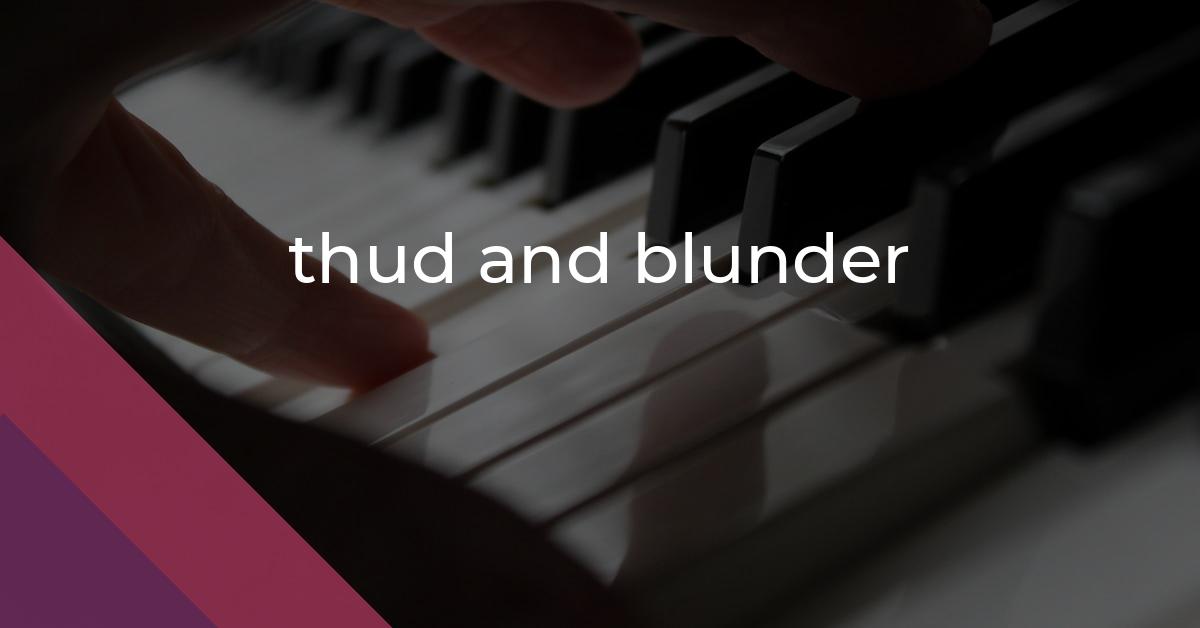thud and blunder: Idiom Meaning and Origin
What does ‘thud and blunder’ mean?
"Thud and blunder" refers to a clumsy or inept action or performance, usually resulting from a lack of skill or preparation. It conveys the idea of a loud, heavy, and careless approach, often with negative consequences.

Idiom Explorer
The idiom "whomp on" means to physically or verbally attack someone or something in a forceful and aggressive manner.
An idiom meaning to disrupt or interfere with a process, plan, or situation, usually causing it to go off track or fail.
The idiom "Three Stooges" refers to a group of three people who are considered silly, clumsy, or incompetent, often engaging in slapstick comedy. It implies a lack of intelligence or common sense in their actions or behavior.
The idiom "thrash out" means to discuss or debate a topic in a thorough and determined manner, often to reach a resolution or agreement.
A "thigh-slapper" is an idiom that refers to something, such as a joke or a funny anecdote, that is extremely hilarious and causes someone to slap their thigh out of laughter.
When someone takes a tumble, they fall down or have a sudden accident.
The idiom "swing and a miss" refers to a failed attempt or effort to do something successfully.
Stick one's foot in it: To say or do something foolish, embarrassing or inappropriate without realizing it, often causing trouble or offense.
The idiom "slam dunk" refers to a sure and effortless accomplishment or success; an action or decision that is guaranteed to be effective and achieve the desired result.
The Significance
The idiom "thud and blunder" is characterized by its origins in 18th and 19th century theater. It emerged as a way to describe a style of acting that was marked by exaggerated gestures, booming voices, and heavy-handed dialogue. In this context, the term "thud" represents the heavy and clumsy movements of actors, while "blunder" signifies the exaggerated and theatrical nature of their performances.
Metaphorically, "thud and blunder" can be used to describe any situation or action that lacks subtlety or finesse. It suggests a lack of sophistication in the approach to a specific task or issue. The phrase implies a tendency towards overacting or being overly dramatic in one's actions or behavior.
Historically, "thud and blunder" has been used to critique theatrical performances that prioritize spectacle and bombast over emotional depth. It highlights the limitations of acting styles that rely on grand gestures rather than genuine emotion and authenticity.
However, the idiom is not limited to the theater. It can be applied to various non-theatrical contexts to indicate a lack of finesse or sensitivity. It can be used to criticize individuals, organizations, or even entire systems that prioritize showmanship and spectacle over substance and thoughtful consideration.
Additionally, "thud and blunder" may suggest a lack of self-awareness or an inability to appreciate the importance of subtlety and nuance in communication or decision-making. It underscores the potential risks of employing overly theatrical or bombastic tactics, which may alienate or repel others instead of persuading or engaging them.
The related idiom "all thumbs" is another expression that describes a lack of coordination or finesse. It refers to someone who is clumsy or awkward in their movements or actions. This idiom aligns with the concept of "thud and blunder," as both phrases convey the idea of lacking subtlety and finesse.
The idiom "butterfingers" is another expression related to "thud and blunder." It is used to describe someone who is prone to dropping things or being careless with their handling of objects. Like "thud and blunder," this idiom implies a lack of finesse and suggests a tendency towards clumsy or awkward behavior.
Finally, the idiom "low blow" can also be associated with "thud and blunder." It is used to describe a hurtful or unfair comment or action, particularly when it is directed towards someone vulnerable or sensitive. This idiom reflects the lack of subtlety and sensitivity associated with "thud and blunder" and further emphasizes the negative consequences of engaging in overly dramatic or insensitive behavior.
To summarize, the idiom "thud and blunder" originated in the context of theater and refers to a style of acting marked by exaggerated gestures and heavy-handed dialogue. It can be used metaphorically to describe any situation or action that lacks subtlety or finesse. The idiom critiques theatrical performances that prioritize spectacle over emotional depth and can be applied to non-theatrical contexts to criticize those who prioritize showmanship over substance. The related idioms "all thumbs," "butterfingers," and "low blow" align with the concept of "thud and blunder" by conveying a lack of finesse and the consequences of clumsy or insensitive behavior. Overall, these idioms underscore the importance of balance, restraint, and thoughtfulness in our actions and interactions.
Example usage
Examples of how the idiom "thud and blunder" can be used in a sentence:
- She entered the room with a thud and blunder, knocking over a vase and stumbling on the carpet.
- The politician's speech was filled with thud and blunder, as he struggled to articulate coherent statements.
- During the first few attempts at cooking, I made a lot of thud and blunder in the kitchen, burning the food and making a mess.
More "Comedy" idioms



